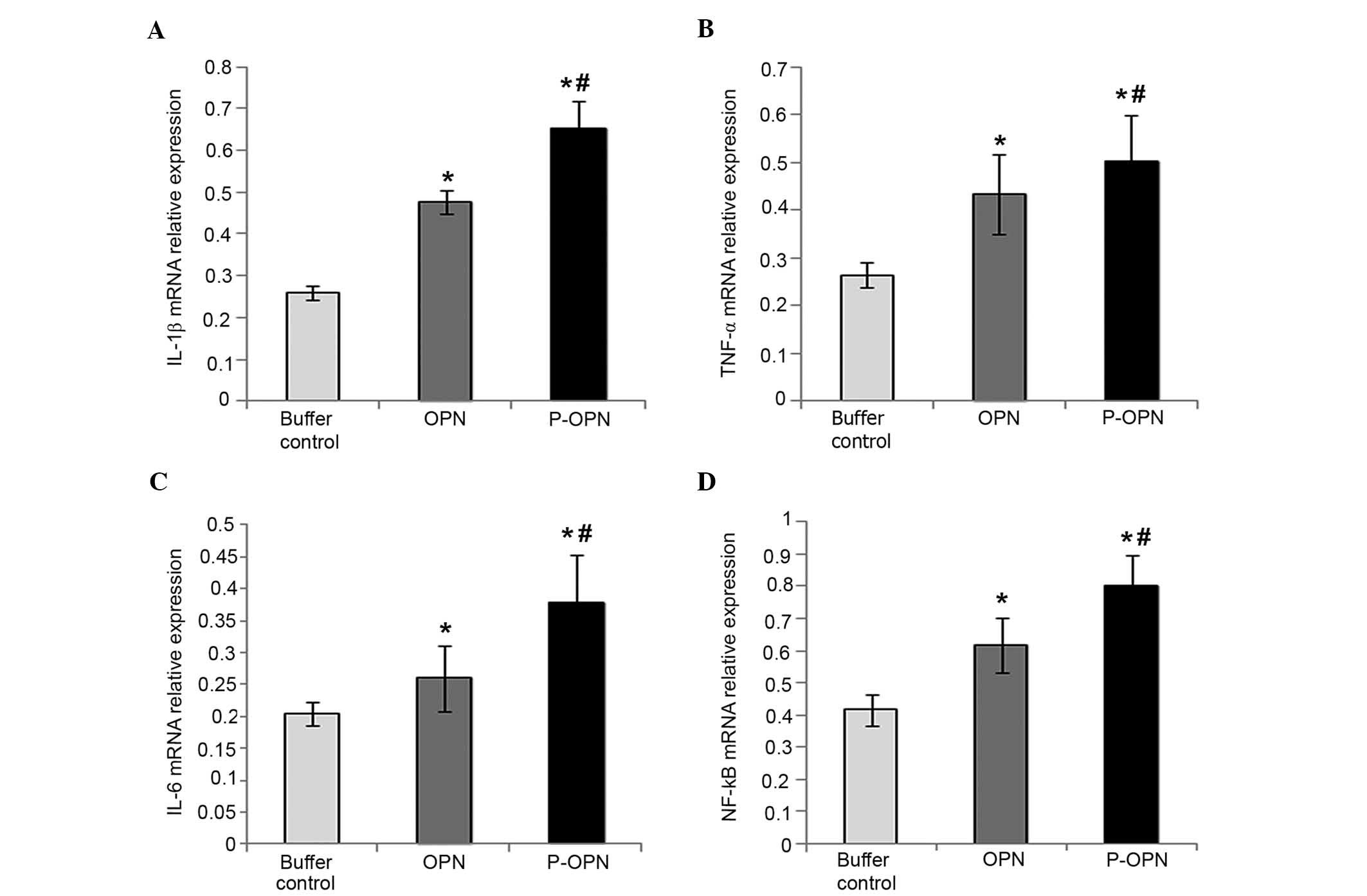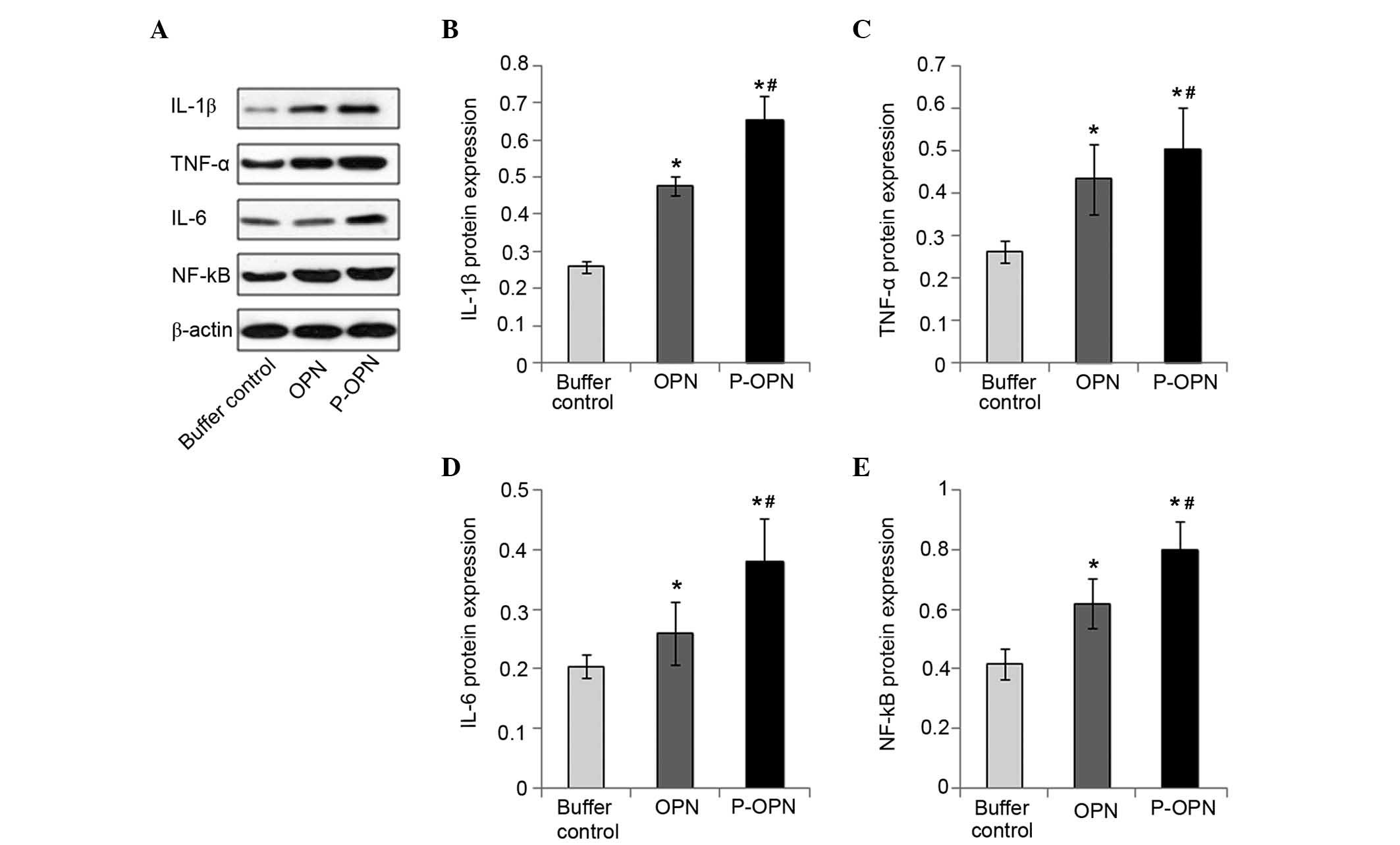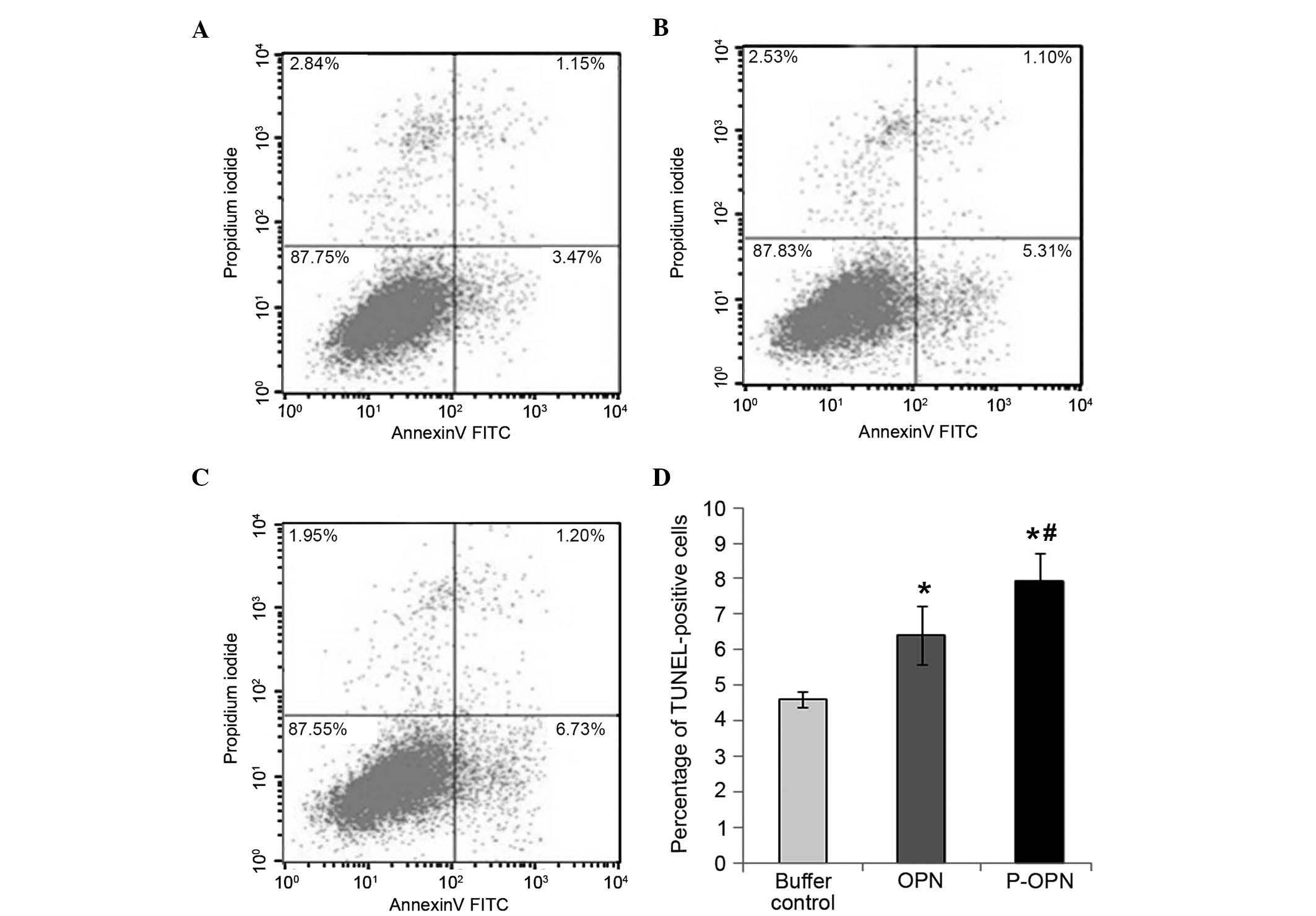|
1
|
Lawrence RC, Felson DT, Helmick CG, Arnold
LM, Choi H, Deyo RA, Gabriel S, Hirsch R, Hochberg MC, Hunder GG,
et al: Estimates of the prevalence of arthritis and other rheumatic
conditions in the United States. Part II. Arthritis Rheum.
58:26–35. 2008. View Article : Google Scholar : PubMed/NCBI
|
|
2
|
Liu M and Hu C: Association of MIF in
serum and synovial fluid with severity of knee osteoarthritis. Clin
Biochem. 45:737–739. 2012. View Article : Google Scholar : PubMed/NCBI
|
|
3
|
Holt HL, Katz JN, Reichmann WM, Gerlovin
H, Wright EA, Hunter DJ, Jordan JM, Kessler CL and Losina E:
Forecasting the burden of advanced knee osteoarthritis over a 10
year period in a cohort of 60–64 year-old US adults. Osteoarthritis
Cartilage. 19:44–50. 2011. View Article : Google Scholar : PubMed/NCBI
|
|
4
|
Sodek J, Ganss B and McKee MD:
Osteopontin. Crit Rev Oral Biol Med. 11:279–303. 2000. View Article : Google Scholar : PubMed/NCBI
|
|
5
|
Xie Y, Sakatsume M, Nishi S, Narita I,
Arakawa M and Gejyo F: Expression, roles, receptors and regulation
of osteopontin in the kidney. Kidney Int. 60:1645–1657. 2001.
View Article : Google Scholar : PubMed/NCBI
|
|
6
|
Pullig O, Weseloh G, Gauer S and Swoboda
B: Osteopontin is expressed by adult human osteoarthritic
chondrocytes: Protein and mRNA analysis of normal and
osteoarthritic cartilage. Matrix Biol. 19:245–255. 2000. View Article : Google Scholar : PubMed/NCBI
|
|
7
|
Attur MG, Dave MN, Stuchin S, Kowalski AJ,
Steiner G, Abramson SB, Denhardt DT and Amin AR: Osteopontin: An
intrinsic inhibitor of inflammation in cartilage. Arthritis Rheum.
44:578–584. 2001. View Article : Google Scholar : PubMed/NCBI
|
|
8
|
Sakata M, Tsuruha JI, Masuko-Hongo K,
Nakamura H, Matsui T, Sudo A, Nishioka K and Kato T: Autoantibodies
to osteopontin in patients with osteoarthritis and rheumatoid
arthritis. J Rheumatol. 28:1492–1495. 2001.PubMed/NCBI
|
|
9
|
Honsawek S, Tanavalee A, Sakdinakiattikoon
M, Chayanupatkul M and Yuktanandana P: Correlation of plasma and
synovial fluid osteopontin with disease severity in knee
osteoarthritis. Clin Biochem. 42:808–812. 2009. View Article : Google Scholar : PubMed/NCBI
|
|
10
|
Matsui Y, Iwasaki N, Kon S, Takahashi D,
Morimoto J, Matsui Y, Denhardt DT, Rittling S, Minami A and Uede T:
Accelerated development of aging-associated and instability-induced
osteoarthritis in osteopontin-deficient mice. Arthritis Rheum.
60:2362–2371. 2009. View Article : Google Scholar : PubMed/NCBI
|
|
11
|
Gao SG, Li KH, Zeng KB, Tu M, Xu M and Lei
GH: Elevated osteopontin level of synovial fluid and articular
cartilage is associated with disease severity in knee
osteoarthritis patients. Osteoarthritis Cartilage. 18:82–87. 2010.
View Article : Google Scholar : PubMed/NCBI
|
|
12
|
Hasegawa M, Segawa T, Maeda M, Yoshida T
and Sudo A: Thrombin-cleaved osteopontin levels in synovial fluid
correlate with disease severity of knee osteoarthritis. J
Rheumatol. 38:129–134. 2011. View Article : Google Scholar : PubMed/NCBI
|
|
13
|
Jiang Y, Yao M, Liu Q and Zhou C: OPN gene
polymorphisms influence the risk of knee OA and OPN levels in
synovial fluid in a Chinese population. Arthritis Res Ther.
15:R32013. View
Article : Google Scholar : PubMed/NCBI
|
|
14
|
Gao SG, Cheng L, Zeng C, Wei LC, Zhang FJ,
Tian J, Tu M, Luo W and Lei GH: Usefulness of specific OA
biomarkers, thrombin-cleaved osteopontin, in the posterior cruciate
ligament OA rabbit model. Osteoarthritis Cartilage. 21:144–550.
2013. View Article : Google Scholar : PubMed/NCBI
|
|
15
|
Zhang FJ, Yu WB, Luo W, Gao SG, Li YS and
Lei GH: Effect of osteopontin on TIMP-1 and TIMP-2 mRNA in
chondrocytes of human knee osteoarthritis in vitro. Exp Ther Med.
8:391–394. 2014.PubMed/NCBI
|
|
16
|
Yang Y, Gao SG, Zhang FJ, Luo W, Xue JX
and Lei GH: Effects of osteopontin on the expression of IL-6 and
IL-8 inflammatory factors in human knee osteoarthritis
chondrocytes. Eur Rev Med Pharmacol Sci. 18:3580–3586.
2014.PubMed/NCBI
|
|
17
|
Martínez-Calleja A, Velasquillo C,
Vega-López M, Arellano-Jiménez MJ, Tsutsumi-Fujiyoshi VK,
Mondragón-Flores R and Kouri-Flores JB: Osteopontin expression and
localization of Ca++ deposits in early stages of osteoarthritis in
a rat model. Histol Histopathol. 29:925–933. 2014.PubMed/NCBI
|
|
18
|
Weber GF, Zawaideh S, Hikita S, Kumar VA,
Cantor H and Ashkar S: Phosphorylation-dependent interaction of
osteopontin with its receptors regulates macrophage migration and
activation. J Leukoc Biol. 72:752–761. 2002.PubMed/NCBI
|
|
19
|
Al-Shami R, Sorensen ES, Ek-Rylander B,
Andersson G, Carson DD and Farach-Carson MC: Phosphorylated
osteopontin promotes migration of human choriocarcinoma cells via a
p70 S6 kinase-dependent pathway. J Cell Biochem. 94:1218–1233.
2005. View Article : Google Scholar : PubMed/NCBI
|
|
20
|
Ek-Rylander B, Flores M, Wendel M,
Heinegárd D and Andersson G: Dephosphorylation of osteopontin and
bone sialoprotein by osteoclastic tartrate-resistant acid
phosphatase. J Biol Chem. 269:14853–14856. 1994.PubMed/NCBI
|
|
21
|
Ek-Rylander B and Andersson G: Osteoclast
migration on phosphorylated osteopontin is regulated by endogenous
tartrateresistant acid phosphatase. Exp Cell Res. 316:443–451.
2010. View Article : Google Scholar : PubMed/NCBI
|
|
22
|
Xu M, Zhang L, Zhao L, Gao S, Han R, Su D
and Lei G: Phosphorylation of osteopontin in osteoarthritis
degenerative cartilage and its effect on matrix metalloprotease 13.
Rheumatol Int. 33:1313–1319. 2013. View Article : Google Scholar : PubMed/NCBI
|
|
23
|
Blanco FJ, Guitian R, Vazquez-Martul E, de
Toro FJ and Galdo F: Osteoarthritis chondrocytes die by apoptosis:
A possible pathway for osteoarthritis pathology. Arthritis Rheum.
41:284–289. 1998. View Article : Google Scholar : PubMed/NCBI
|
|
24
|
Kim HA, Lee YJ, Seong SC, Choe KW and Song
YW: Apoptotic chondrocyte death in human osteoarthritis. J
Rheumatol. 27:455–562. 2000.PubMed/NCBI
|
|
25
|
Aigner T, Soder S, Gebhard PM, McAlinden A
and Haag J: Mechanisms of disease: Role of chondrocytes in the
pathogenesis of osteoarthritis-structure, chaos and senescence. Nat
Clin Pract Rheumatol. 3:391–399. 2007. View Article : Google Scholar : PubMed/NCBI
|
|
26
|
Hashimoto S, Ochs RL, Komiya S and Lotz M:
Linkage of chondrocyte apoptosis and cartilage degradation in human
osteoarthritis. Arthritis Rheum. 41:1632–1638. 1998. View Article : Google Scholar : PubMed/NCBI
|
|
27
|
Dalal S, Zha Q, Daniels CR, Steagall RJ,
Joyner WL, Gadeau AP, Singh M and Singh K: Osteopontin stimulates
apoptosis in adult cardiac myocytes via the involvement of CD44
receptors, mitochondrial death pathway and endoplasmic reticulum
stress. Am J Physiol Heart Circ Physiol. 306:H1182–H1191. 2014.
View Article : Google Scholar : PubMed/NCBI
|
|
28
|
Katayama Y, House CM, Udagawa N, Kazama
JJ, McFarland RJ, Martin TJ and Findlay DM: Casein kinase 2
phosphorylation of recombinant rat osteopontin enhances adhesion of
osteoclasts but not osteoblasts. J Cell Physiol. 176:179–187. 1998.
View Article : Google Scholar : PubMed/NCBI
|
|
29
|
Livak KJ and Schmittgen TD: Analysis of
relative gene expression data using real-time quantitative PCR and
the 2(−Delta Delta C(T)) Method. Methods. 25:402–408. 2001.
View Article : Google Scholar : PubMed/NCBI
|
|
30
|
Anborgh PH, Mutrie JC, Tuck AB and
Chambers AF: Pre- and post-translational regulation of osteopontin
in cancer. J Cell Commun Signal. 5:111–122. 2011. View Article : Google Scholar : PubMed/NCBI
|
|
31
|
Morimoto J, Kon S, Matsui Y and Uede T:
Osteopontin; as a target molecule for the treatment of inflammatory
diseases. Curr Drug Targets. 11:494–505. 2010. View Article : Google Scholar : PubMed/NCBI
|
|
32
|
Berenbaum F: Osteoarthritis as an
inflammatory disease (osteoarthritis is not osteoarthrosis!).
Osteoarthritis Cartilage. 21:16–21. 2013. View Article : Google Scholar : PubMed/NCBI
|
|
33
|
Chevalier X, Eymard F and Richette P:
Biologic agents in osteoarthritis: Hopes and disappointments. Nat
Rev Rheumatol. 9:400–410. 2013. View Article : Google Scholar : PubMed/NCBI
|
|
34
|
Husa M, Liu-Bryan R and Terkeltaub R:
Shifting HIFs in osteoarthritis. Nat Med. 16:641–644. 2010.
View Article : Google Scholar : PubMed/NCBI
|
|
35
|
O'Regan A and Berman JS: Osteopontin: A
key cytokine in cell-mediated and granulomatous inflammation. Int J
Exp Pathol. 81:373–390. 2000. View Article : Google Scholar : PubMed/NCBI
|
|
36
|
Kuhn K, D'Lima DD, Hashimoto S and Lotz M:
Cell death in cartilage. Osteoarthritis Cartilage. 12:1–16. 2004.
View Article : Google Scholar : PubMed/NCBI
|
|
37
|
Christensen B, Nielsen MS, Haselmann KF,
Petersen TE and Sorensen ES: Post-translationally modified residues
of native human osteopontin are located in clusters: Identification
of 36 phosphorylation and five O-glycosylation sites and their
biological implications. Biochem J. 390:285–292. 2005. View Article : Google Scholar : PubMed/NCBI
|

















